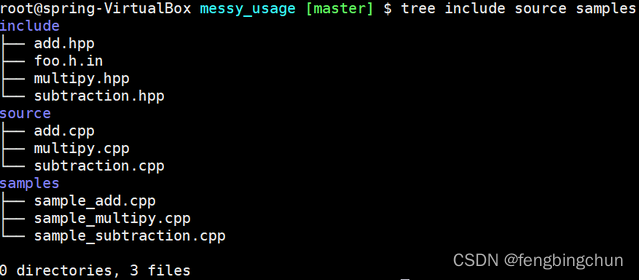-
CMake中add_executable的使用
CMake中的add_executable命令用于使用指定的源文件向项目(project)添加可执行文件,其格式如下:
- add_executable(
[WIN32] [MACOSX_BUNDLE] - [EXCLUDE_FROM_ALL]
- [source1] [source2 ...]) # Normal Executables
- add_executable(
IMPORTED [GLOBAL]) # Imported Executables - add_executable(
ALIAS ) # Alias Executables
1.Normal Executables:添加一个名为
的可执行目标(executable target),该目标将从命令调用中列出的源文件中构建(built)。 对应于逻辑目标名称,并且必须在项目中全局唯一(globally unique).生成的可执行文件的实际文件名是基于本机平台(native platform)的约定构建的(例如 .exe或仅 ).
add_executable的源参数可以使用语法为$<...>的"generator expressions"。
如果以后使用target_sources命令添加源文件,则可以省略这些源文件。
默认情况下,将在与调用命令的源树目录相对应的构建树目录中创建可执行文件(the executable file will be created in the build tree directory corresponding to the source tree directory in which the command was invoked)。可以使用RUNTIME_OUTPUT_DIRECTORY目标属性更改此位置。可以使用OUTPUT_NAME目标属性更改到最终文件名。
如果给定了WIN32,则将在创建的目标上设置WIN32_EXECUTABLE属性.
如果给出了MACOSX_BUNDLE,则将在创建的目标上设置相应的属性。
如果给出了EXCLUDE_FROM_ALL,则将在创建的目标上设置相应的属性。- include_directories(${CMAKE_CURRENT_SOURCE_DIR}/include)
- add_executable(sample_add ${CMAKE_CURRENT_SOURCE_DIR}/source/add.cpp ${CMAKE_CURRENT_SOURCE_DIR}/samples/sample_add.cpp)
- if(TARGET sample_add)
- message("target: sample_add") # print
- endif()
2.Imported Executables:一个IMPORTED可执行目标引用位于项目之外的可执行文件。不会生成任何规则来构建它,并且IMPORTED目标属性为True.目标名称在创建它的目录及其下的目录中具有作用域(has scope),但是GLOBAL选项扩展了可见性。可以像在项目中构建的任何目标一样引用它。IMPORTED可执行文件对于从 add_custom_command之类的命令中方便地引用很有用。导入的可执行文件通过设置名称以IMPORTED_开头的属性来指定。最重要的此类属性是IMPORTED_LOCATION(及其配置的版本IMPORTED_LOCATION_
),它用于指定主可执行文件在磁盘上的位置。 - add_executable(xxxx IMPORTED)
- if(TARGET xxxx)
- message("target: xxxx") # print
- endif()
3.Alias Executables:创建一个别名目标(Alias Target),以便
可用于在后续的命令中引用 。 不会作为make目标出现在所生成的构建系统中 。可能不是ALIAS。
An ALIAS can target a GLOBAL Imported Target.
An ALIAS can target a non-GLOBAL Imported Target.这种别名的作用域是创建它的目录和子目录。ALIAS_GLOBAL目标属性可以用来检查别名是不是全局的。
ALIAS目标可用作目标,以从中读取自定义命令和自定义目标的可执行文件的属性。也可以使用常规的if(TARGET)子命令测试它们的存在。不能用来修改 ,即,它不能用作set_property, set_target_properties,target_link_libraries等命令的操作数。ALIAS目标不能被安装或导出。的属性 - include_directories(${CMAKE_CURRENT_SOURCE_DIR}/include)
- add_executable(sample_subtraction ${CMAKE_CURRENT_SOURCE_DIR}/source/subtraction.cpp ${CMAKE_CURRENT_SOURCE_DIR}/samples/sample_subtraction.cpp)
- add_executable(yyyy ALIAS sample_subtraction)
- if(TARGET yyyy)
- message("target: yyyy") # print
- endif()
- if(TARGET sample_subtraction)
- message("target: sample_subtraction") # print
- endif()
执行测试代码需要多个文件:
build.sh内容如下:
- #! /bin/bash
- # supported input parameters(cmake commands)
- params=(function macro cmake_parse_arguments \
- find_library find_path find_file find_program find_package \
- cmake_policy cmake_minimum_required project include \
- string list set foreach message option if while return \
- math file configure_file \
- include_directories add_executable add_library target_link_libraries install)
- usage()
- {
- echo "Error: $0 needs to have an input parameter"
- echo "supported input parameters:"
- for param in ${params[@]}; do
- echo " $0 ${param}"
- done
- exit -1
- }
- if [ $# != 1 ]; then
- usage
- fi
- flag=0
- for param in ${params[@]}; do
- if [ $1 == ${param} ]; then
- flag=1
- break
- fi
- done
- if [ ${flag} == 0 ]; then
- echo "Error: parameter \"$1\" is not supported"
- usage
- exit -1
- fi
- if [[ ! -d "build" ]]; then
- mkdir build
- cd build
- else
- cd build
- fi
- echo "==== test $1 ===="
- # test_set.cmake: cmake -DTEST_CMAKE_FEATURE=$1 --log-level=verbose ..
- # test_option.cmake: cmake -DTEST_CMAKE_FEATURE=$1 -DBUILD_PYTORCH=ON ..
- cmake -DTEST_CMAKE_FEATURE=$1 ..
- # It can be executed directly on the terminal, no need to execute build.sh, for example: cmake -P test_set.cmake
- make
- make install # only used in cmake files with install command
CMakeLists.txt内容如下:
- cmake_minimum_required(VERSION 3.22)
- project(cmake_feature_usage)
- message("#### current cmake version: ${CMAKE_MAJOR_VERSION}.${CMAKE_MINOR_VERSION}.${CMAKE_PATCH_VERSION}")
- include(test_${TEST_CMAKE_FEATURE}.cmake)
- message("==== test finish ====")
test_add_executable.cmake内容为上面的所有测试代码段。
另外还包括三个目录:include,source,samples,它们都是非常简单的实现,仅用于测试,如下:

可能的执行结果如下图所示:

-
相关阅读:
计算机系统概论、进制转换部分习题
vue3-基础知识(4)- 组件
PHP:错误控制运算符
boost-asio-1-定时器使用
Redis(05)| 数据结构-哈希表
GitHub 上有个沙雕开发者,做了款斗图工具后火了...
【Python+selenium】如何高效地将driver定位到当前窗口
Reactive UI -- 反应式编程UI框架入门学习(二)
SpringCloud-Gateway网关实现入参统一解密
【浅学Java】Linux常用命令
- 原文地址:https://blog.csdn.net/fengbingchun/article/details/128160463
